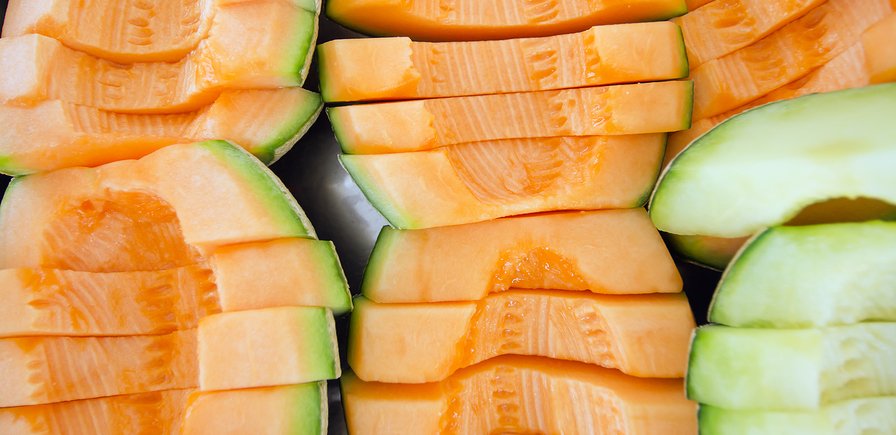August 9th is Melon Day. This is a holiday you may not be familiar with, but one definitely worth celebrating. The holiday’s origins lie in Turkmenistan in central Asia, where the country’s fertile soils and delicious melons were highly prized, and back in 1994 a day was declared in their honor. But lucky for the rest of us, melons grow around the world in the United States, Europe, Africa, and beyond, so you don’t have to plan an exotic trip to get a taste of these delicious fruits.
Summer is a wonderful time to indulge in melon since it is at its peak season in many places. That doesn’t mean, however, that it is only a summer fruit. It may not be locally harvested, but you can enjoy good quality melon all year round. If you prefer melon from local farms, you can always stock up on it, then cut it up and freeze it in freezer bags for up to nine months.
There are many varieties of melon, and since cassava, crenshaw, and galia melons and their many relatives are all enjoyable in their own right, you can certainly feel free to explore the options. We’ve already discussed the plentiful merits of watermelon, which is part of the same cucurbitaceae family as melons, but also cucumbers, squash, pumpkins, and more. But for now, we will concentrate on two of the most popular ones—cantaloupe and honeydew.
A few of the health benefits of melon consumption include:
Immunity Enhancement
Chock full of beta-carotene, vitamin C, vitamin A, and other nutrients, melons make an important contribution to the optimal functioning of your immune system. In fact, fruits like cantaloupe were shown in a 2015 study at Purdue University in West Lafayette, Indiana to improve the function of specific immune cells within the intestines.1 Kim, Myung H.; et al. “Retinoic Acid Differentially Regulates the Migration of Innate Lymphoid Cell Subsets to the Gut.” Immunity. 30 June 2015. Accessed 12 July 2017. http://www.cell.com/immunity/fulltext/S1074-7613(15)00231-9.
Cancer Protection
The antioxidants and phytochemicals present in melons have been linked to the prevention of abnormal cell growth. A 2013 study at the Harvard School of Public Health in Boston, Massachusetts found that melons can help lower the risk of breast cancer.2 Jung, Seungyoun; et al. “Fruit and Vegetable Intake and Risk of Breast Cancer by Hormone Receptor Status.” Journal of the National Cancer Institute. 5 February 2013. Accessed 12 July 2017. http://www.ncbi.nlm.nih.gov/pmc/articles/PMC3593764/.
Weight Reduction
Cantaloupe comes in at 53 calories per cup and honeydew is similarly low at 61 calories per cup. High in fiber, they can increase your feelings of satiety, making you feel like you don’t need more food without adding many calories to your daily total. Plus, the fiber aids your digestive process, moving food along and eliminating waste efficiently.
Inflammation Prevention
Melons contain choline, a nutrient involved in several important brain and central nervous system functions. Choline was shown in a 2006 study at the Feinstein Institute for Medical Research in Manhasset, New York to inhibit cellular inflammation, which can contribute to a range of conditions including cardiovascular disease.3 Parrish, W.R.; et al. “Choline Suppresses Inflammatory Responses.” Shock. June 2006. Accessed 13 July 2017. http://journals.lww.com/shockjournal/Fulltext/2006/06001/Choline_Suppresses_Inflammatory_Responses.137.aspx.
Eye Health
Melons are rich in vitamin A, which is beneficial to the health of the retina (the portion of the eye that receives light and sends signals to the brain). In addition, carotenoids such as lutein and zeaxanthin have been found to lower the risk of cataracts and macular degeneration, which are two of the most common eye diseases in older adults.
Now that you’re ready to go buy a few cantaloupes and honeydews, choose your melons wisely. Look for fruits that are ripe, but not overripe. They should feel relatively heavy in your hand, and be firm with no soft spots. If you give the melon a tap, it sounds hollow if it is ripe.
As for serving ideas, both cantaloupe and honeydew go nicely mixed with a variety of fruits in a summer fruit salad. Pureed melon can be the basis of a chilled summer soup. Many people like melon with a little bit of creamy yogurt or cottage cheese. Then again, if you adhere to the principles of food combining, which is meant to optimize digestion, you might want to take note of the old adage about melons: eat em alone or leave em alone. If so, then it should be noted that melons are quite tasty eaten on their own with no accompaniment at all when sliced into sections or diced into cubes or even shaped into little balls with a melon scoop. But feel free to experiment and enjoy some melon not only on August 9th, but every day.
And if you find yourself without melons for a time, you can always use a full-spectrum antioxidant formula that provides a full complement of carotenoids that you’d otherwise be missing.
References
| ↑1 | Kim, Myung H.; et al. “Retinoic Acid Differentially Regulates the Migration of Innate Lymphoid Cell Subsets to the Gut.” Immunity. 30 June 2015. Accessed 12 July 2017. http://www.cell.com/immunity/fulltext/S1074-7613(15)00231-9. |
|---|---|
| ↑2 | Jung, Seungyoun; et al. “Fruit and Vegetable Intake and Risk of Breast Cancer by Hormone Receptor Status.” Journal of the National Cancer Institute. 5 February 2013. Accessed 12 July 2017. http://www.ncbi.nlm.nih.gov/pmc/articles/PMC3593764/. |
| ↑3 | Parrish, W.R.; et al. “Choline Suppresses Inflammatory Responses.” Shock. June 2006. Accessed 13 July 2017. http://journals.lww.com/shockjournal/Fulltext/2006/06001/Choline_Suppresses_Inflammatory_Responses.137.aspx. |












I had breast March 2016 ,
I had breast March 2016 , bilateral mastectomy
Six hour xsix treatment 1ever 3 weeks. I want to not have to go through any of this again any information that could help I would love to have
Have you read or downloaded
Have you read or downloaded Jon’s audio book? It’s free, see link above, “Free Book.”